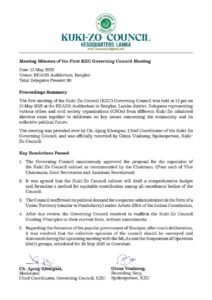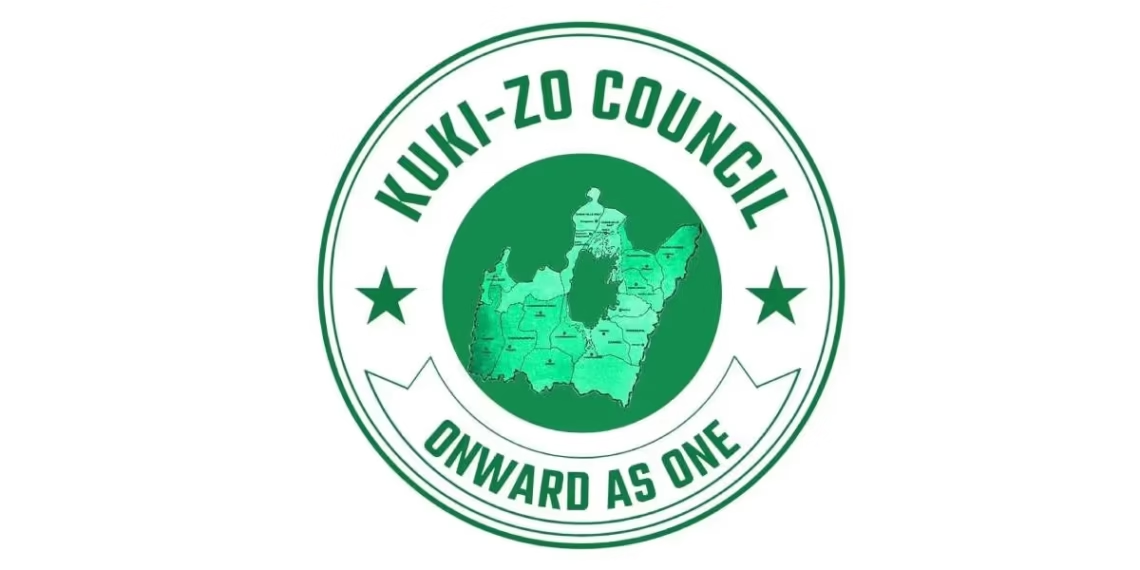At a historic gathering in Lamka, 90 Kuki-Zo leaders and civil society representatives charted a united political course—calling for a Union Territory, approving cabinet expansion, and outlining equitable financial reforms.
May 13, 2025
In a significant show of political unity and strategic planning, the Kuki-Zo Council (KZC) held its first-ever Governing Council meeting at the READS Auditorium in Rengkai, Churachandpur district. The historic gathering brought together 90 delegates representing various tribes and civil society organisations (CSOs) from across Kuki-Zo inhabited districts to deliberate on critical issues concerning the community’s political future.
Presided over by Chief Coordinator Ch. Ajang Khongsai, and officially recorded by Spokesperson Ginza Vualzong, the meeting focused on long-term governance goals, financial planning, and a renewed political roadmap.
Core Resolution: Demand for Separate Union Territory
At the heart of the deliberations was the reaffirmation of the Kuki-Zo community’s political demand for a separate administration in the form of a Union Territory under Article 239A of the Indian Constitution, modeled after Puducherry.
ALSO READ: Kuki-Zo Leadership Meets to Push for Separate Administration
“The reaffirmation of the Union Territory demand marks a decisive moment in our collective journey. This is a constitutional demand based on the right to equitable self-governance,” said a KZC spokesperson following the meeting.

The resolution reasserts the community’s view that only a Union Territory structure can ensure justice, administrative equity, and long-term peace for the Kuki-Zo people following recent upheavals and long-standing grievances.
Five Key Resolutions Passed
In addition to the Union Territory demand, the Governing Council unanimously passed five resolutions:
- Expansion of Cabinet: The Council approved the expansion of the Kuki-Zo Council cabinet, adding four new members each to the roles of Vice Chairmen, Joint Secretaries, and Assistant Secretaries, to strengthen leadership representation and coordination.
- Transparent Budgeting: The Council resolved to formulate a comprehensive annual budget and develop a system for equitable financial contributions from all constituent bodies, aimed at ensuring fiscal transparency and shared responsibility.
- Political Reaffirmation: Beyond the headline demand for Union Territory status, the meeting served to consolidate political clarity, ensuring that all factions of the council stood united on the demand.
- Guiding Principles Upheld: The Council reaffirmed the Kuki-Zo Council Guiding Principles in their current form, electing not to introduce any amendments at this time, signaling internal ideological stability.
- Formation of a Popular Government: The Council discussed the uncertain political situation in Manipur and resolved to convey the collective opinion of the Kuki-Zo people regarding a popular government. These views will be formally presented during the upcoming strategic meeting on 16 May 2025 in Guwahati with elected MLAs and Suspension of Operation (SoO) groups.
ALSO READ: Why Manipur Needs Continuation of President’s Rule (Part-2)
“We are committed to working with both political representatives and armed groups under SoO to build a stable, inclusive framework for our people,” added a senior council member.
Next Steps: Strategic Consultations in Guwahati
The next major development in the Kuki-Zo political roadmap will take place on 16 May 2025 in Guwahati, where the Council will meet with Members of the Legislative Assembly (MLAs) and SoO groups such as the Kuki National Organisation (KNO) and United People’s Front (UPF).
This meeting is expected to be a critical juncture in formalizing the community’s collective voice and strengthening the push for separate administrative status.














